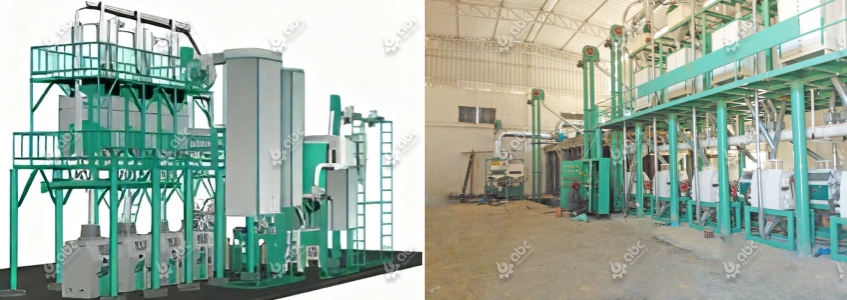Thinking about setting up a flour mill in Pakistan but unsure where to begin? This section provides a complete, practical guide for investors, engineers, and entrepreneurs interested in entering the country’s wheat milling industry. You’ll find insights into market trends, plant setup procedures, machinery pricing, operational planning, and policy requirements.
Start exploring the articles below to understand every key step of building and managing a successful flour mill in Pakistan.
The flour mill industry in Pakistan is one of the country’s most critical segments in the agro-based economy. With over 1,200 registered flour mills and an annual wheat consumption exceeding 27 million metric tons, it directly influences national food security. The domestic Pakistan flour market trends show an average annual growth of 4.2%, driven by urbanization and a rising demand for packaged flour.
Government policy supports wheat procurement at subsidized rates—approximately PKR 3,900 per 40 kg—stabilizing raw material costs for mill operators. The export potential remains significant as neighboring countries such as Afghanistan and Central Asian states import nearly 500,000 tons of flour annually from Pakistan. However, energy shortages, logistics inefficiencies, and fluctuating wheat prices present operational challenges that demand modernization and energy-efficient solutions.
Pakistan’s flour sector is evolving toward integrated supply chains, automation, and value-added products such as fortified and specialty flour. Investors can benefit from policy incentives in the Special Economic Zones (SEZs), where industrial land costs are 20–30% lower than in urban centers.
The combination of population growth, government wheat support schemes, and modern technology integration positions Pakistan as an attractive destination for new flour mill investments.
Partner with us to evaluate your project feasibility and develop a profitable flour milling investment strategy in Pakistan.
To start a flour mill plant in Pakistan, investors must first complete the flour mill business registration in Pakistan, involving trade licensing, environmental clearance, and food safety certifications from the Punjab Food Authority or Sindh Food Department. The process typically takes 30–45 days and requires an initial capital declaration of around PKR 10–15 million.
Choosing the right site impacts both logistics and cost. Industrial zones near wheat-producing regions like Punjab can reduce raw material transport expenses by up to 18%. A typical flour mill requires 2,000–3,000 square meters of land with access to electricity (11 kV industrial connection) and water supply (at least 15,000 liters/day).
| Setup Element | Estimated Cost (PKR Million) | Percentage of Total |
|---|---|---|
| Land & Civil Works | 25–35 | 25% |
| Machinery & Equipment | 40–50 | 40% |
| Utilities & Electrical Systems | 10–15 | 15% |
| Licensing & Legal Compliance | 3–5 | 5% |
| Working Capital | 10–15 | 15% |
Reliable equipment ensures consistent flour quality. A medium-sized plant (100 tons/day) generally requires roller mills, plan sifters, purifiers, and pneumatic conveyors. Local suppliers offer competitive rates, while European and Chinese machinery can reduce energy consumption by up to 25% per ton. Investors should verify supplier credentials, warranties (typically 2 years), and after-sales service capability.

Reliable Flour Mill Machine Manufacturer - ABC Machinery in China
The flour mill cost estimation in Pakistan varies from PKR 80–120 million for a standard medium-sized facility. Operating costs—mainly wheat, electricity, and labor—constitute about 85% of total expenditure. Profit margins typically range between 12–18%, depending on scale and automation level.
For efficient project management, investors are encouraged to use digital planning tools like Manufacturing Execution Systems (MES) to monitor workflow efficiency and optimize yield. A well-executed setup can achieve breakeven within 2.5 to 3 years, assuming stable wheat prices and consistent output of 100 tons/day.
Get Your Customized Flour Mill Setup Blueprint — Contact Our Engineering Team Today to Begin Your Project.
Efficient flour mill plant layout directly impacts production throughput and operational safety. A typical plant includes three process sections: cleaning, grinding, and packaging. The wheat flour milling process starts with pre-cleaning using magnetic separators and destoners to remove impurities, followed by conditioning the grain to 14% moisture content for optimal grinding performance. Advanced roller systems can process 5–10 tons/hour with energy consumption around 65 kWh/ton.
Automation plays a key role in the automatic flour mill plant in Pakistan, with programmable logic controllers (PLC) managing grain flow, sifting cycles, and packaging lines. Such automation can reduce manpower requirements by 30% and product variation by 15%.

Start Flour Mill Business in Pakistan: From Paper Design to Reality
Unlock productivity gains with our process optimization and automation integration services for Pakistani flour mills.
Investment in a flour mill project cost Pakistan typically generates an internal rate of return (IRR) between 16–22%, with payback in 3–4 years under stable market conditions. Energy accounts for nearly 18% of flour mill operating cost, creating a strong incentive for adopting sustainable milling technology in Pakistan.
Eco-conscious investment models are gaining traction, particularly for export-oriented projects complying with ISO 22000 and HACCP standards. Investors adopting sustainable systems often benefit from green financing options offered by the State Bank of Pakistan at subsidized interest rates.
Transform your investment into a sustainable operation—consult our team to design an energy-efficient flour mill aligned with global standards.